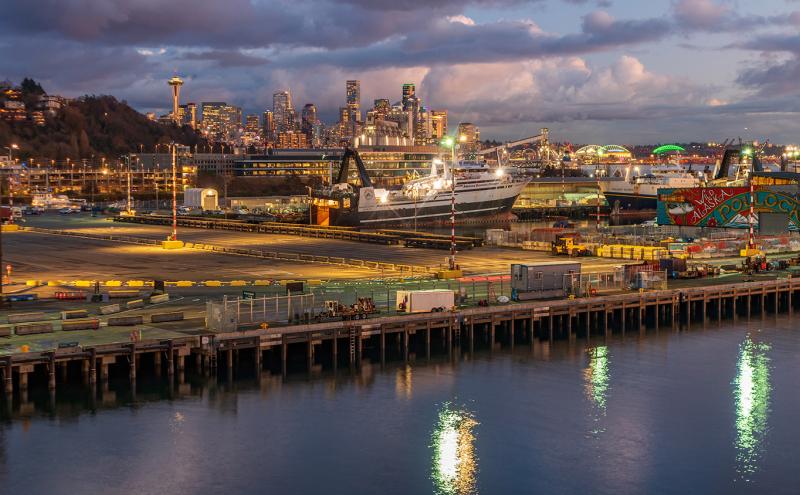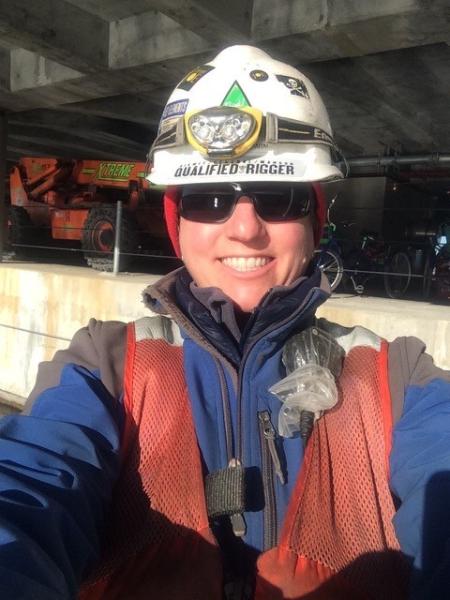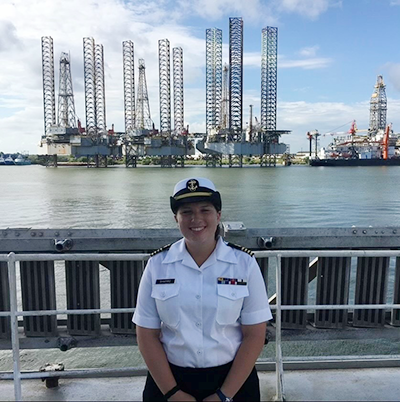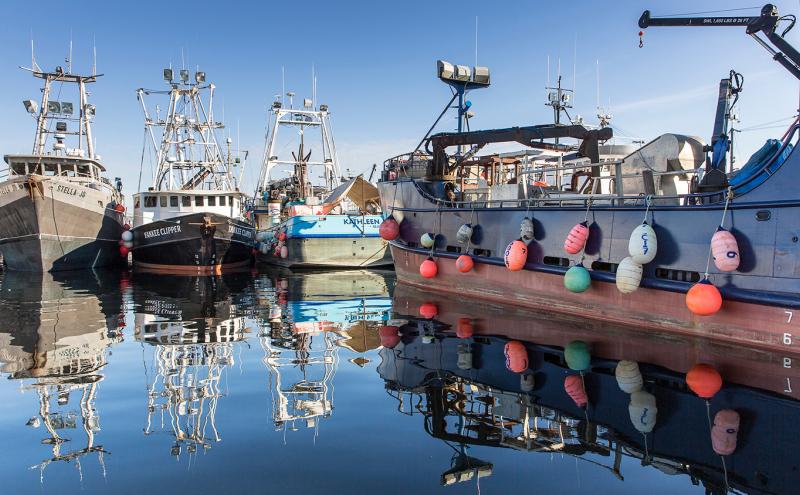
In the first of this two-part series to celebrate Women’s History Month, meet three women charting a course for a bright future in the Port of Seattle’s Maritime division. Learn what they love about their jobs and industries, and their advice to other women looking to take the plunge. Sea where a career in maritime can take you! Read part two of the series→
Kelli Goodwin
Senior Manager of Maritime Operations
1. How long have you worked in the maritime industry and what was your journey to your current role?
I switched from a 12-year career in banking and investments to running a tug and a crane barge in 2002. Having been a competitive water skier in college, I thought I was leaving banking and investments to begin a waterski business and justify a new ski boat for my new business. Along the way, I learned I would need a captain’s license to charge people money on the water. A friend introduced me to a tug boat captain and shortly thereafter I was working with him moving barges, performing dockings at local shipyards, and running a self-propelled crane barge.
2. What does your current job entail and what do you love about it?
My role as Senior Manager, Maritime Operations entails a wide variety of work and as such, keeps me busy and interested as each day is different and full of challenges. My work includes managing a 24/7 Maritime Operations Team that oversees the management of 10 commercial moorage facilities. Our customers include businesses from the tug and barge industry, research vessels, ships of state, fishing vessels, marine construction, and the occasional super yacht. As I mentioned, the variety in my customers and my work is really what brings me joy in my work.
3. What's the most surprising thing about working in maritime?
What surprised me most about maritime is just how varied this industry is! A person can be and do just about anything in this industry. And the people in the industry tend to be kind, supportive, and wonderful to work with.
4. What advice do you have for women considering a career in maritime?
You can be and do anything you want to in this life. Don’t let anyone tell you differently. I never would have imagined that today I would hold a 1600tn Inland Master’s License, a Master of Towing license, an AB Limited License, know how to push and pull big boats and barges, know how to weld, know how to run a crane, and run a business consisting of 10 port properties …. But here I am, and I love it.
Rut Perez-Studer
Senior Manager of Fishing and Commercial Vessel Services
1. How long have you worked in the maritime industry and what was your journey to your current role?
My official experience in maritime began when I started working at the Port two years and four months ago. Previously I worked for the United Parcel Service (UPS) in logistics for 12 years, and before that, I did architectural design for hospitals, schools, and community facilities. I volunteered with the Seattle Maritime Academy over the past seven years, where the dean helped me understand maritime and the career opportunities available to help communities get out of generations of poverty. Together we focused our attention on BIPOC and Latinx communities.
I obtained my Master of Business Administration (MBA) at Erasmus University in the Netherlands, which has the third largest Port in the world. In my MBA program, I did several projects with the Port, learning more about maritime and its opportunities and complexities. When this position at the Port became available, my background of managing people, running a team, managing facilities, and architectural design all came together for my career journey.
2. What does your current job entail and what do you love about it?
At Fishermen’s Terminal, essentially, we provide spaces and services to move commerce and support local economic development and small businesses. I also manage facilities to create a safe space for fishing boats and equipment. I review relevant capital project development plans and as a people manager, I support my team as much as possible.
Fishermen’s Terminal was the Port’s first facility and has a lot of public visibility. We introduce the local community, politicians, groups of high school students, interns, and underrepresented communities to maritime jobs. I have a passion for presenting opportunities to youth and community, and giving tours connecting to the fishermen and vendors is a unique experience. I love walking the docks, learning from them, and listening to fishing stories. They are very generous with their time and information sharing.
3. What's the most surprising thing about working in maritime?
It feels like such a large industry, but when we do peer port visits to Alaska and the Washington region, it feels small. It is a supportive community that is hard-working. Although fishers compete for fishing, if there is an emergency, they support one another. That’s not always the case in other industries. The other surprising realization of the maritime industry is that there are low barriers to entry into the maritime field. The opportunities to build a career and obtain good living wage jobs are impressive.
4. What advice do you have for women considering a career in maritime?
A career in maritime is a wonderful opportunity to earn, learn, and travel. We need to see one another in various roles in the industry, not only because it’s important for representation, but WE CAN because we have the skills to do it. Roles for women are changing. Having women as part of the industry brings an opportunity to see the world in a different way. It IS a place for women to work, build resilience, and grow. In the last two years, I’ve seen more and more young women throwing nets and I’ve met at least two female fishing boat captains, one running a team of all women. They are not afraid to try and work hard. So, the advice is: don’t be afraid; it is a great industry to be a part of.
Madison Edwards
Billing Analyst, Maritime Operations
1. How long have you worked in the maritime industry and what was your journey to your current role?
My journey began with a strong passion for maritime and sailing, cultivated through my involvement with Sea Scouts during high school and my education at California Maritime Academy, where I majored in Marine Transportation and minored in Business Administration. I gained hands-on experience with vessel operations and upon graduation, I obtained an Unlimited U.S. Coast Guard Third Mate’s License, allowing me to operate vessels of any tonnage. However, I later decided to explore another passion of mine by entering the film/television industry and working for NBCUniversal in production accounting on high-budget TV shows. Missing my involvement in the maritime industry, I looked for a job that would let me integrate my maritime knowledge and accounting skills — leading me to my current role at Port of Seattle!
2. What does your current job entail and what do you love about it?
I currently work as the Maritime Operations Billing Analyst at Terminal 91. In my role, I support the Maritime Operations Management Team by facilitating financial control for 10 Port properties and managing monthly billing for over 200 customers in the Maritime Operations portfolio. What I love most about my job is the dynamic environment of working at a commercial terminal. My office is far from ordinary — I get to observe the bustling port activity and enjoy views of the Olympics, Seattle Skyline, and Puget Sound all in one place. It is truly exciting! I take great pride in working for the Port of Seattle and representing women in the maritime industry and community.
3. What's the most surprising thing about working in maritime?
The most surprising aspect of working in maritime is the diversity of career opportunities it presents, ranging from sailing on tankers and cargo ships to towing barges and helping manage and assist with vessel operations at the docks. Additionally, maritime careers are not limited to onboard roles; they also encompass vital shored-based positions — everything from billing and procuring items for vessels, to safety managers and crew management, all the way to the shipyards and putting vessels in dry dock. The maritime community, both commercial and recreational, spans globally, fostering a supportive network. This sense of community, along with the variety of career paths available and the diversity of people you can work with, makes the maritime industry uniquely rewarding.
4. What advice do you have for women considering a career in maritime?
I encourage women to pursue a career in maritime with confidence. I was one of seven women in a class of roughly 100 men at Cal Maritime. The maritime industry is challenging, yet it offers a variety of opportunities for personal and professional growth that you can’t necessarily get elsewhere. A supportive community of incredible, hardworking, and dedicated women awaits, ready to collaborate and overcome any obstacles together. Whether at sea or onshore, the maritime sector promises a fulfilling path for those passionate about it. Don’t let stereotypes or challenges hold you back from pursuing your dreams in the industry!









